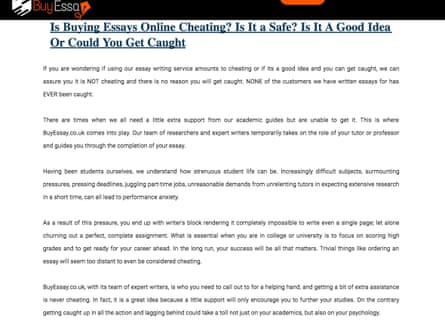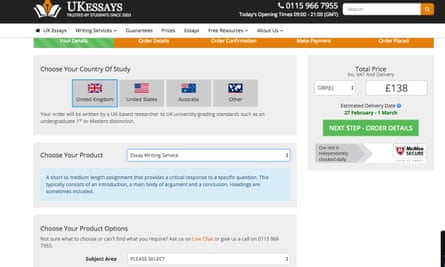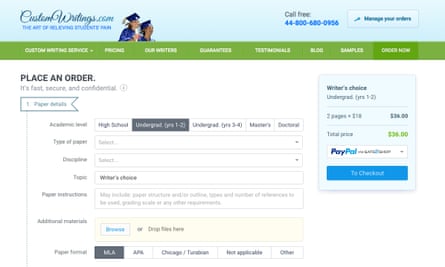Ministers concerned about the growing scale of cheating at university have announced a crackdown on so-called “essay mill” websites that provide written-to-order papers for students to submit as part of their degrees.
Jo Johnson, the universities minister, has asked student bodies and institutions for guidance to help combat “contract plagiarism”, where tens of thousands of students are believed to be buying essays for hundreds of pounds a time.
A report by the independent university regulator last summer found that essay writing websites often advertise their services to students for a fee and many promote “plagiarism-free guarantees” or essays tested against plagiarism detection software.
According to the Quality Assurance Agency (QAA), there are now more than 100 essay mill websites in operation. The amount they charge is dependent on the complexity of the essay and tightness of deadline, ranging from several hundred pounds for a single essay to £6,750 for a PhD dissertation.
In Britain it is left to individual institutions to develop their own plagiarism policies. But in its research, the QAA recommended new laws to make it illegal to help students “commit acts of academic dishonesty for financial gain”, punishable with fines of up to £5,000. It suggested the UK look to New Zealand, where essay mills have been fined and their assets have been frozen.
The Guardian was on Monday able to access several websites that offered essays on most if not all degree subjects. Most sites required a name, email address and debit card details to purchase an essay, with no restriction on the area of study being requested.
On one site, buyessay.co.uk, students were required to enter the requested attainment level for the essay, the desired length and deadline as well as a description of the assignment. Most sites also asked the desired format of the essay, including line spaces and footnote style. The prices quoted to the Guardian varied from £36 for a two-page essay to £154 for 1,500 words.
The buyessay.co.uk site also carried a message saying use of the essay writing service did not constitute cheating.





The new guidance, expected to be available for the beginning of the 2017-18 teaching year, is to include tough penalties for those who use the websites and offer more information on the potential impact on students’ future careers.
Calling on universities to do more to crack down on contract plagiarism, Johnson said: “This form of cheating is unacceptable and every university should have strong policies and sanctions in place to detect and deal with it.”
Thomas Lancaster, an associate dean at Staffordshire University and one of the UK’s leading experts on essay cheating, said that while universities had anti-plagiarism software to detect copying of academic texts, they could not prevent the process of contract cheating, where students employ ghostwriters to complete new assignments.
“We think this is a substantial problem affecting universities, that students can go and pay other people to do their assignments for them,” he said.
Working in collaboration with Prof Robert Clarke of Birmingham City University, Lancaster identified at least 30,000 examples of students purchasing essays online.
“We’ve been looking at sites where students publicly post their request, but a lot of sites are hidden so that number is just a tiny proportion of all the work,” he said. “We’re confident there’s tens of millions of pounds of business going through essay mills sites every year. It’s big business.
“Advertising appears around university campuses, we observed people giving out business cards in car parks, people putting up flyers on lampposts, even sometimes getting their adverts into secure parts of university buildings.”
The sites are based all over the world, Lancaster said, and quite often the same company operates under a number of domains. “We can put legislation in place to prevent sites from operating from within the UK but they could just move overseas,” he said, adding that the focus could be placed on tackling UK-based advertising of the services on campuses, search engines and social media.
The QAA has been tasked with taking action against the online advertising of the services and to work with international agencies to tackle the problem.
Meanwhile, an amendment has been proposed by Lord Storey, co-chair of the committee on education, families and young people, to the higher education and research bill that would make it an offence to provide or advertise cheating services.
“It’s not illegal for sites to offer to write model essays, it’s not illegal for somebody to buy an essay, but of course if they buy an essay, hand it in, and get a degree they don’t deserve and use that degree to get a job, then there is some kind of fraudulent transaction going on there,” Lancaster said. “I do think universities should do more to tackle essay mills and work with students but universities also need support from the government and a legal framework, it’s a two-way street.”
The government’s move also comes a month after researchers at Swansea University recommended the state bring in tougher new regulations to impose fines on essay mills after concluding the 2006 Fraud Act was unlikely to be effective in tackling the issue, largely due to disclaimers and caveats used by the companies.
“We would hope that a legal approach would at least act as a deterrent to would-be users of these services and serve as a lever to change behaviour,” Michael Draper and Philip Newton, co-authors of the report, wrote in a blogpost.
“However, legal changes alone are not the answer to this problem. We need to ensure that assessments are rigorous and less open to completion by a third party ... we need to make sure it is preferable for students to ‘do the right thing’.”
Ian Kimber, QAA’s director of universities, quality enhancement and standards, said: “Essay mills are a major challenge for universities and colleges because, unlike other forms of cheating, the practice is notoriously difficult to detect.”
Dame Julia Goodfellow, president of Universities UK, emphasised that submitting work written by someone else constituted cheating, and said she would continue to work with QAA and the National Union of Students to update sector guidance in the area.
“Universities have severe penalties for students found to be submitting work that is not their own,” Goodfellow added. “Such academic misconduct is a breach of an institution’s disciplinary regulations and can result in students, in serious cases, being expelled from the university.”








